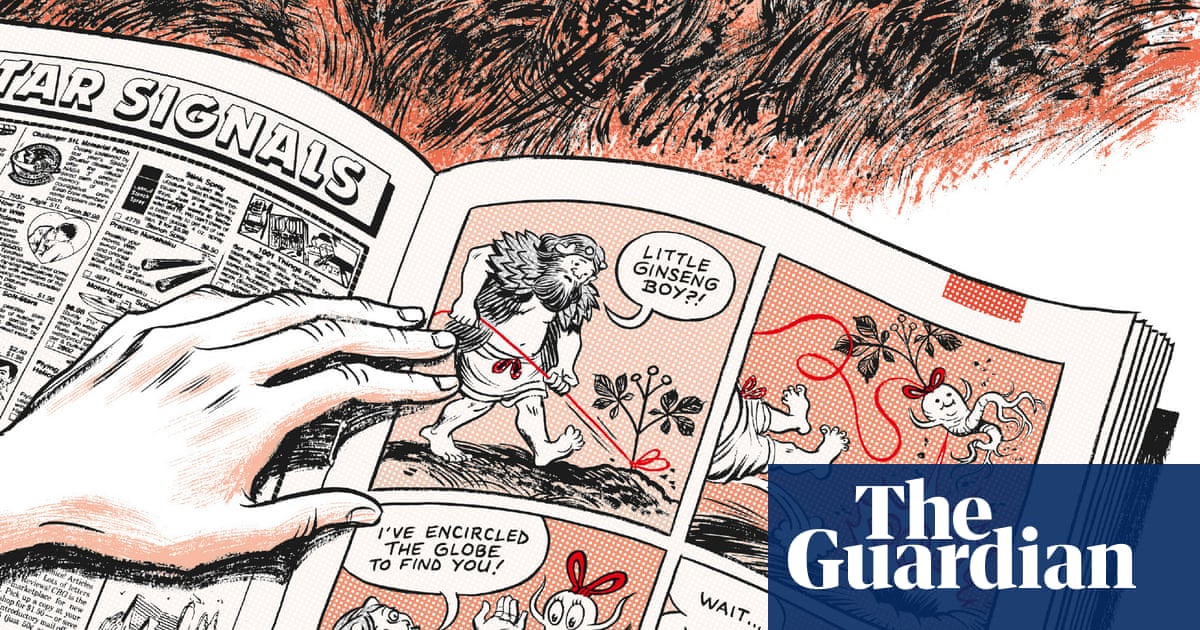Genre is a slippery beast at the best of times, but Craig Thompson’s new book is particularly hard to categorise. It’s a memoir, graphic novel, and piece of social commentary, all based around ginseng. Living in the dirt poor (literally) midwest in the 1980s, his family farmed the plant, with its weird humanoid roots, and Thompson and his brother spent their youths caked in mud and chemicals plucking them from the ground for a dollar an hour. Ginseng is an essential ingredient in many Chinese medicines, as well as a range of health gimmicks, and for various reasons, Wisconsin has been an unlikely centre of global production for several centuries.
Originally published in 12 issues from 2019 to 2024, Ginseng Roots is epic in length and breadth, but simultaneously pleasingly narrow in scope. It plays out in multiple strands that examine both the minutiae of a man’s life and the cultural history of a difficult-to-grow crop (once harvested, it cannot be grown in the same field again).
Thompson’s reputation is built on his first memoir, Blankets, published in 2003, in which he drew the story of his coming of age, including the rejection of his Baptist parents’ strict beliefs. It was one of those rare comics that broke into the mainstream, and was deservedly heaped with praise. In 2024, Blankets was one of 13 books banned from libraries in the state of Utah, the reasons presumably being that it contains depictions of masturbation, abusive parents, and the repudiation of evangelical Christianity.
Some of those themes recur in Ginseng Roots. We hear about why his parents were in this strange business of small-holding ginseng agriculture in the first place, and again about their conservative Christianity. As his father dies, Thompson reflects on how he depicted them in Blankets. But he has a disarming and uncanny knack for switching gear without you noticing. Perhaps this is something peculiar to the medium of the graphic novel, where the art keeps a sense of an overarching narrative despite a change in view. All of a gentle sudden, we are deep in the 18th-century world of trade between Iroquois and Chinese merchants, paddle steamers and canoes, learning about this untold history of American globalisation that pivots on ginseng. In 1784, the first ship to set sail from the newly independent America for China carried 30 tons of American ginseng bound for the herbal medicine market, the cargo’s value 250 times its weight in silver.
Then we are back on the farm, immersed in the conundrums of midwest politics: farmers being subsumed by corporations, swamped by pesticides, but seemingly happily committed to an apocalyptic theology that will deliver them the promised land when the rapture comes.
In this sense, Ginseng Roots is one version of the broader American story. This odd plant, with mystical properties (or, to put it another way, its unregulated and scientifically questionable active ingredient) took root in the midwest, became big business through export, and left behind disgruntled small-holders, who eventually got replaced by immigrant workers. Class and poverty play major roles, and Thompson himself is full of working-class doubt, about his talent and his choice of career a long way from home.
It’s all suffused with a love of comics: the dollar an hour that Thompson and his brother earned as children doing back-breaking, knee-crippling work was always spent on superhero and Star Wars comics. The normalisation of graphic literature in mainstream culture is enormously rewarding for those of us for whom faded monochrome dot-printed words and pictures were how we learned stories. “Comics helped me survive my childhood,” he tells his brother later in life, their younger selves looking on as they go through old boxes of ewoks and X-Men. “But what will help me survive my adulthood?”
Memoirs are meant to have an elegiac quality to them, and this one, despite being about root vegetables, is soulful, funny, and exquisitely drawn. Like Blankets, Ginseng Roots is a modern classic: moving, and weirdly educational – a gentle yet perspicacious story of global politics, capitalism, religion, and life at the edges of all of those forces.
Ginseng Roots by Craig Thompson is published by Faber (£25). To support the Guardian order your copy atguardianbookshop.com. Delivery charges may apply
